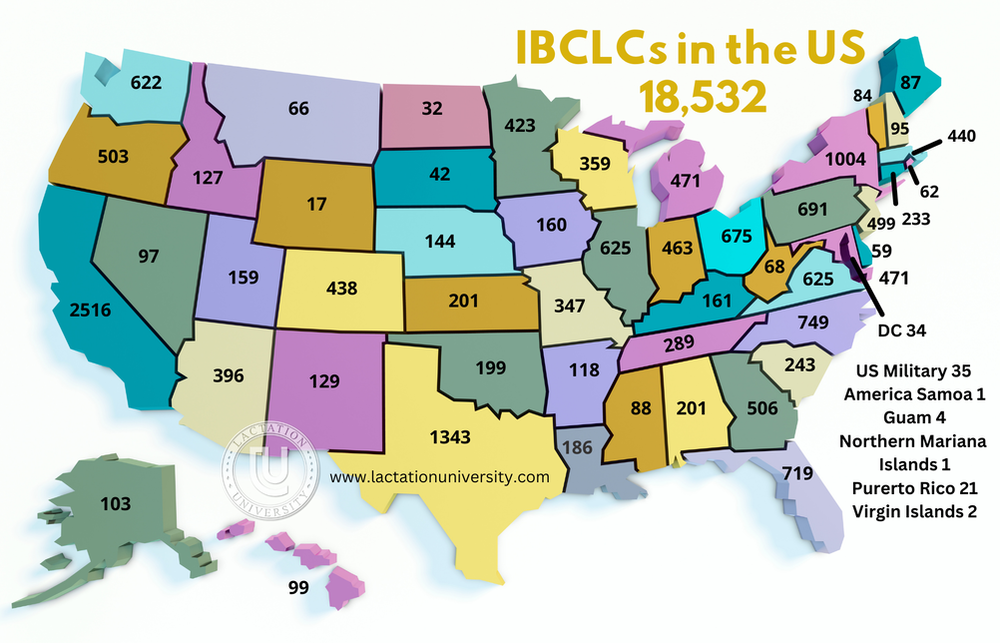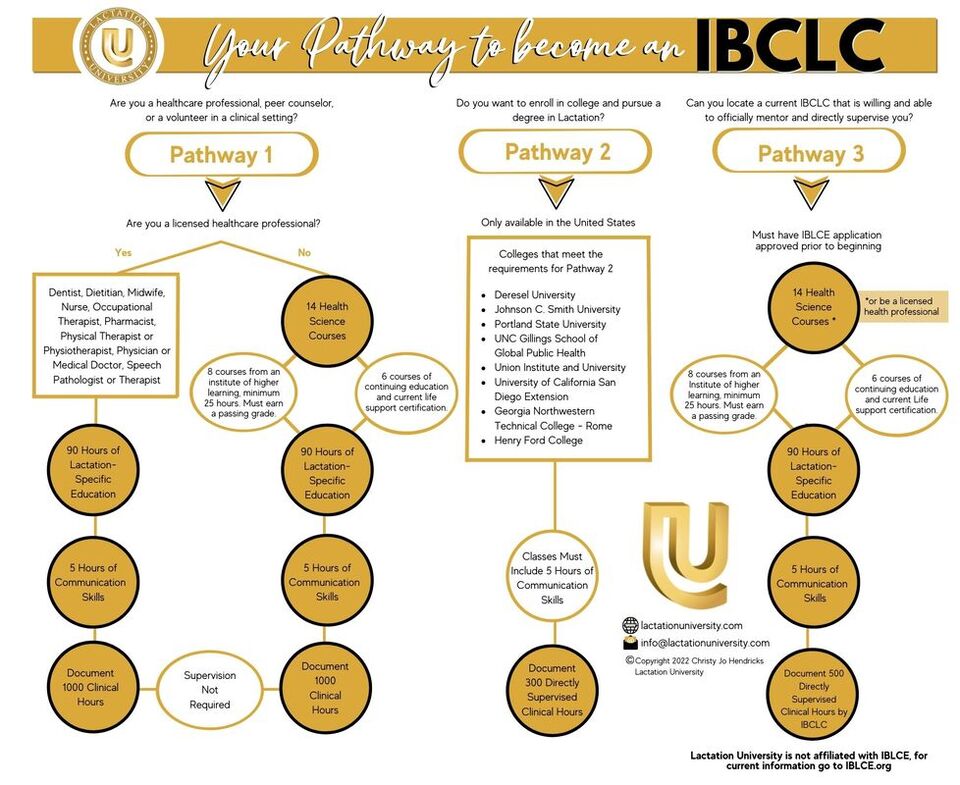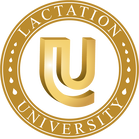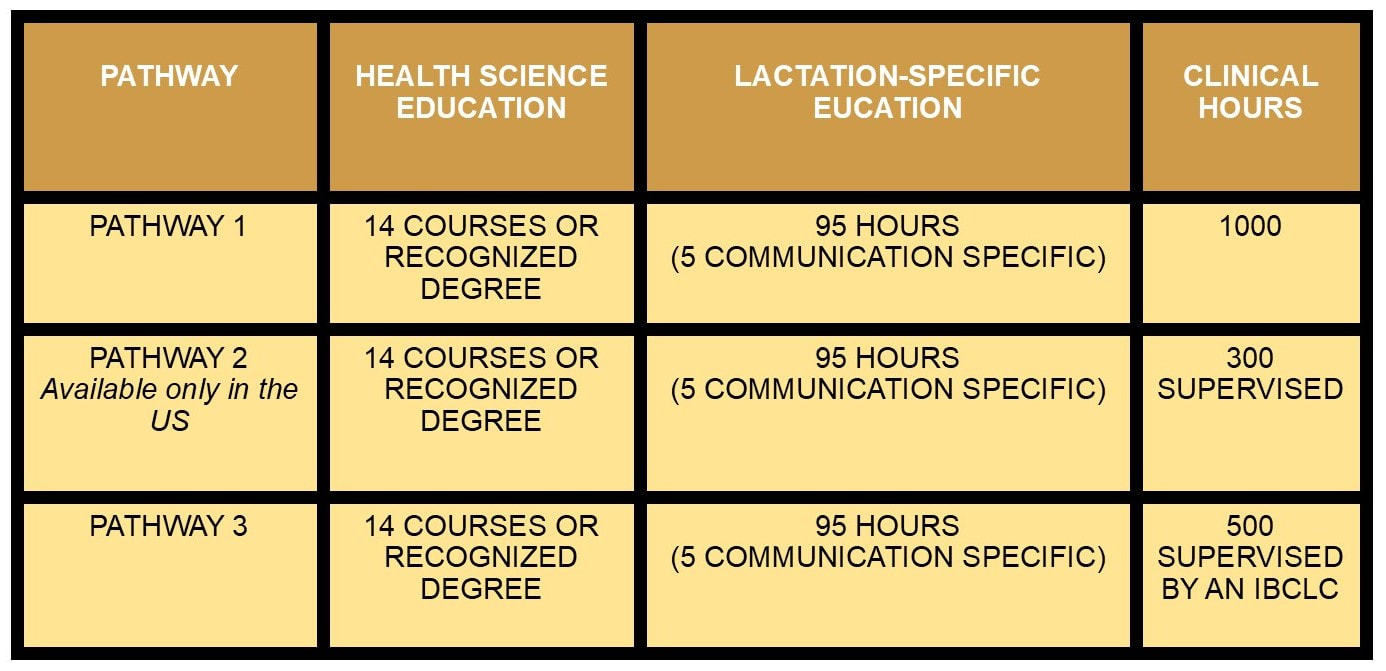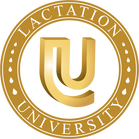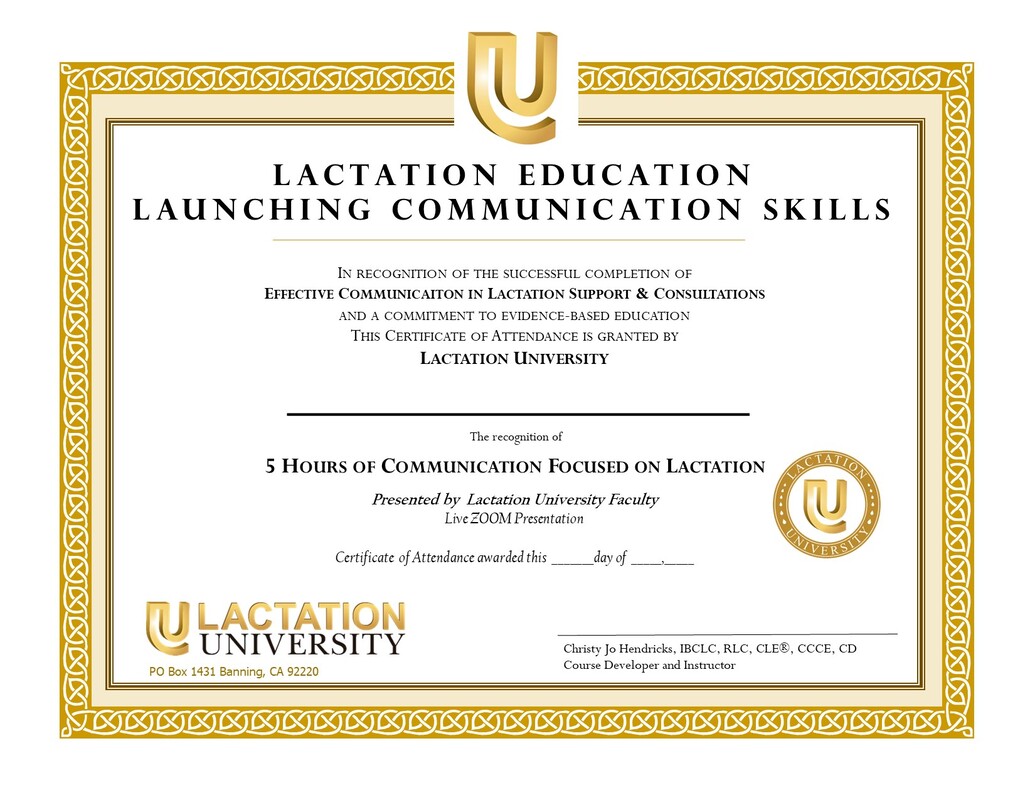An International, Board-Certified Lactation Consultant is a healthcare professional who provides clinical management of breastfeeding. IBCLC is the highest lactation credential available.
The International Board of Lactation Consultant Examiners (IBLCE) founded the profession in 1985 in order to standardize the emerging profession of lactation consulting. In 2022, the profession boasts 36,000 members in 131 countries. The United States, along with the military bases and Pacific Islands, is home to 18,532 Lactation Consultants. The History of the IBCLC includes information on this fairly new profession.
We want to help you get "on the map"
There is a tremendous need for more professionals to enter this field. There are not enough clinicians to meet the current or growing demand for lactation support. Lactation University is here to support aspiring IBCLCs during every step on their journey to obtain the certification.
There are 3 distinct pathways to becoming an IBCLC. Any student can choose any pathway, but one may be better suited for your situation. Check out the descriptions to better understand your options.
Consider the pathway choice carefully. Each pathway has pros and cons. A candidates job or volunteer position can help determine the best pathway. Financial investment can also be a factor is selecting pathways. Each pathway has the same requirements, but how they are met and the number of hours vary. For instance, Pathway 1 requires 1,000 clinical hours; Pathway 2 requires 300 clinical hours and Pathway 3 requires 500 clinical hours. Although it may look appealing to pursue Pathway 3, one must locate a willing, qualified IBCLC mentor, pay an application fee and complete shadowing. There is often a fee associated with hiring a mentor. The Pathways and requirements will be detailed below.
Pathway 1: Recognized Health Professionals and Recognized Breastfeeding Support Counsellors
This pathway is best suited for those working in a hospital, birth center, community clinic, lactation care clinic/practice, or a primary care practitioner's practice/office. The hours you work at your job providing direct client support in the area of breastfeeding can be counted towards your clinical hour requirements. If you teach prenatal classes, offer phone support, facilitate weekly meet-ups or discuss breastfeeding with families, keep track of that time--each hour will bring you closer to meeting the 1,000 hour requirement.
You can also earn the clinical hours as a volunteer with an approved organization. IBLCE has a list of Recognized Breastfeeding Support Counselor Organizations. Lactation University was added by IBLCE in 2022. LU established the LUVS program to help advocates earn the clinical hours necessary to qualify for the exam.
Even though Pathway 1 requires the most clinical hours, these hours do not have to be directly supervised.
LU has a complete journal and guide for becoming an IBCLC. Enjoy these complimentary pages and check list from the journal.
You can also earn the clinical hours as a volunteer with an approved organization. IBLCE has a list of Recognized Breastfeeding Support Counselor Organizations. Lactation University was added by IBLCE in 2022. LU established the LUVS program to help advocates earn the clinical hours necessary to qualify for the exam.
Even though Pathway 1 requires the most clinical hours, these hours do not have to be directly supervised.
LU has a complete journal and guide for becoming an IBCLC. Enjoy these complimentary pages and check list from the journal.
Pathway 2: Accredited Lactation Academic Programs
Pathway 2 is currently only available in the United States. Students must complete a comprehensive academic program in human lactation and breastfeeding that is accredited by CAAHP (or another accrediting body with equivalent accreditation standards). Students are still required to complete the college courses, but some institutions may provide some or all in the university program. This option would be a good choice for those who can secure grants or have college funds from MyCAA or the GI Bill.
Pathway 3: Mentorship with an IBCLC

This pathway involves locating a current IBCLC that is willing to act as a chief mentor. Candidates can have several IBCLC mentors, but one must take on the role of chief mentor, complete the application and assume responsibility for the mentee.
Mentors will require a time of shadowing prior to allowing mentees to perform consulting duties. This time frame should be discussed prior to making a commitment. A good mentor/mentee relationship is vital.
IBLCE also requires an application to be submitted and approved prior to entering into a contract with a mentor.
The application fee established by IBLCE is $100-$50 based on the tier of the country the application originates from. Although this pathway has 500 clinical hours required (half of Pathway 1) each clinical hour must be directly supervised by an IBCLC.
Mentors will require a time of shadowing prior to allowing mentees to perform consulting duties. This time frame should be discussed prior to making a commitment. A good mentor/mentee relationship is vital.
IBLCE also requires an application to be submitted and approved prior to entering into a contract with a mentor.
The application fee established by IBLCE is $100-$50 based on the tier of the country the application originates from. Although this pathway has 500 clinical hours required (half of Pathway 1) each clinical hour must be directly supervised by an IBCLC.
Requirement 1: College Courses
Good News! If you already possess a degree as a health professional recognized by IBLCE, you do not have to take additional college courses. The organization concurs that in order to obtain a license or certificate, professionals have already met the education standards. In case of an audit, candidates would only need to show proof of license/certificate. If someone does not possess a current degree, IBCLC Candidates are required to have all college courses completed prior to applying for the exam. Candidates should check their transcripts. The college courses (unlike other requirements) never expire. If candidates completed classes decades ago, they are still applicable. Candidates also need to check the description in the college catalog. Students might have taken a course that meets the IBLCE requirements, but was listed differently on a transcript. For instance, a student might have completed a math course that would qualify for statistics if the catalogue includes statistics in the course description.
Applicants must complete and receive a passing score from an accredited institution for 14 subjects. The first 8 require they meet the criteria of at least 25 academic hours. IBLCE provides a graph of all 14 requirements.
For the remaining 6 subjects, candidates may complete courses offered by an institution of higher learning or continuing education courses.
Applicants must complete and receive a passing score from an accredited institution for 14 subjects. The first 8 require they meet the criteria of at least 25 academic hours. IBLCE provides a graph of all 14 requirements.
- Biology
- Human Anatomy
- Human Physiology
- Infant Child Growth and Development
- Introduction to Clinical Research
- Nutrition
- Psychology or Counselling Skills or Communication Skills
- Sociology or Cultural Sensitivity or Cultural Anthropology
For the remaining 6 subjects, candidates may complete courses offered by an institution of higher learning or continuing education courses.
- Basic Life Support
- Medical Documentation
- Medical Terminology
- Occupational Safety and Security for Health Professionals
- Professional Ethics for Health Professionals
- Universal Safety Precautions and Infection Control
Requirement 2: Lactation-Specific Education (90 Hours) and Communication (5 Hours)
Applicants must collect at least 90 seat hours (60 min hours) in human lactation and breastfeeding. In addition, 5 hours must focus on communication. These hours must be completed within 5 years of applying to sit the IBLCE Exam. The required hours can be completed in a variety of ways.
- Includes in-person presentations, online education, distance learning and independent study modules.
- Education may be from an IBLCE verified Continuing Education Recognition Points (CERP) Provider, but it is not required to be.
- Education is to be on topics that are specific to lactation and breastfeeding, examples of which can be found on the IBCLC Detailed Content Outline.
- IBLCE uses a 60-minute hour to calculate the education hours.
Launching Communication SkillsSome organizations include the 5 hours of communication with their comprehensive 95 hour course. The 5 hours of communication can be takes separately. Since the requirement was not introduced until 2021, some aspiring IBCLCs need to take it since it was not originally included during the year they completed their 90 hours of lactation-specific education. Lactation University will include it in the Lactation-specific education, but it is also available a la carte from LU.
|
Requirement 3: Clinical Hours (Steps 2 & 3 can be completed simultaneously)
Applicants must earn their required clinical hours within 5 years of applying for the IBLCE Exam. Clinical hours are required for all three pathways. If a candidate selects Pathway 1 (working or volunteering as a breastfeeding support counselor), they are required to document 1,000 clinical hours. Applicates who have selected Pathway 2 (enrolled in an accredited academic lactation program), they must provide 300 hours of directly supervised lactation support . If an applicate has selected Pathway 3 (shadowing and mentoring by a current IBCLC), they must document 500 supervised hours. Although one IBCLC must agree to be the main mentor, other IBCLCs can be included to help students reach their clinical hours requirement).

